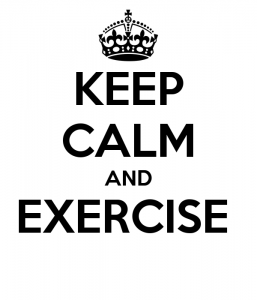By Kaitlyn Massey, Psychologist
Is anyone else fed up hearing the old message that you need to exercise and eat healthy or else… Or else what? We are swamped with daily messages from magazines and television shows about how to get that fab body “in 10 minutes or less”, and there are new exercise fads being promoted by celebrities constantly. But is there more to exercise than simply losing weight and minimising our risk of cardiovascular disease? And what is so good about exercise anyway?

Beyond the physical benefits, I truly believe that exercise is the number one thing we can do to support our mental and social health. Here are 6 key reasons why:
1. Exercise can alter the chemicals in our brain. Research shows that exercise can alter the serotonin levels in our brain, which can lead to improved mood (Puetz, T, 2006). Exercise also burns stress hormones such as adrenaline, which can help you to feel more relaxed. And in some cases it has even been demonstrated that exercise can be just as affective as anti-depressant medication for the treatment of depressive symptoms (Blumenthal et. al., 2007).
2. Exercise can increase social connectedness. Joining a sporting club or community exercise group can increase your sense of social connectivity, which enhances a person’s sense of wellbeing. I recently participated in Sydney’s City to Surf 14km run. One of the most enjoyable aspects of the race was running alongside 80,000 other people who had the same goal. The community spirit was alive with hundreds of people lining the streets to cheer on complete strangers and support them all the way to the finish line.
3. Exercise can increase your energy levels. It sounds paradoxical: How can burning energy actually increase my energy levels? I know myself after a long day at work the last thing I feel like doing is going for a run, however research suggests that when people who generally live a sedentary lifestyle (i.e. work in an office all day) complete regular exercise, they report having more energy (Puetz, T, 2006). This is a result of the physiological effects of exercise, such as increasing muscle mass, improving circulation, improving the regulation of blood sugar levels, reducing body fat and fat in the blood stream, and increasing the heart’s pumping capacity.
4. Exercise Improves physical health – and therefore your psychological health. As people’s physical health improves, they also tend to notice a boost in their self-esteem and confidence (Nauert, 2009).

5. Exercise can improve your sleep. Having a good night’s sleep is hugely important for our psychological wellbeing and research shows that exercise can help us improve our sleep. Physical activity can stimulate longer periods of slow-wave sleep, which is considered the deepest and most restorative stages of sleep. Exercise has also been shown to improve sleep for people with diagnosed sleep disorders such as insomnia (Passos, et al., 2011).
6. Exercise can provide you with a sense of achievement. When get home after a long day at work and you have a million other things to be doing, and all you really want to do is crash on the couch, and you choose to go for that walk instead – that’s an achievement! Dr James Blumenthal puts it like this; “I think that one of the other appeals of exercising is that people are really taking an active role in their treatment. I think this appeals to a lot of people. Taking a pill is a very passive kind of activity. Exercising obviously requires more active participation. And I think having a sense of control over what you’re doing and feeling that sense of accomplishment are important” (Blumenthal, 2001).
So how much exercise should you be doing to see these benefits? The Australian Government’s Physical Activity Guidelines state that:
- Doing any physical activity is better than doing none. If you currently do no physical activity, start by doing some, and gradually build up to the recommended amount.
- Aim for a minimum of 30 minutes moderate-intensity physical activity per day.
- Be active on most, preferably all, days every week.

My general philosophy is to aim for 45-60 minutes a day, at least 5 days per week. This could be broken up into 30 minutes in the morning and 30 minutes in the evening, but whatever fits into your busy schedule. Fitting exercise into your calendar might be as simple as turning your Saturday morning “coffee catch up” with your bestie, into a “walk and talk” time instead. Most importantly, take time to notice how you feel before and after you exercise. When you stop and reflect for a moment on how that morning run has made you feel, you start to develop the motivation to get up and do it again the next day. As the philosopher Henry David Thoreau put it, “An early-morning walk is a blessing for the whole day.”
So, next time you hear somebody telling you to exercise, why not use it as a cue to consider your psychological wellbeing? Exercise shouldn’t be a chore but a choice; a lifestyle decision you make every day; to choose to be more vibrant, more energised, more productive, more connected with yourself, others and the world.

*Consult your GP before engaging in strenuous activity.
** For additional motivation, check out Dr Mike Evans presentation on YouTube here. Can you sleep and be sedentary for just 23.5 hours per day?
References
Blumenthal, J. (2001). Depression and Exercise [Audio Transcript]. Quantum ABC Television.
Blumenthal, J. A., Babyak, M. A., Doraiswamy, P. M., Watkins, L., Hoffman, B. M., Barbour, K. A., … & Sherwood, A. (2007). Exercise and pharmacotherapy in the treatment of major depressive disorder. Psychosomatic medicine, 69(7), 587.
Commonwealth of Australia. (2014). More than half of all Australian adults are not active enough. Retrieved from The Department of Health website: http://www.health.gov.au/internet/main/publishing.nsf/
Evans, M. (2011). 23 and 1/2 hours: What is the single best thing we can do for our health? [Video file]. Retrieved from https://www.youtube.com/watch?v=aUaInS6HIGo
Inspiration. (2013). Exercise is 4% [Image]. Retrieved from iheartinspiration.com
KarmaJello. (2014). Exercise photo [Photograph]. Retrieved from http://karmajello.com/health-fitness/workouts/exercise-best-preventive-drug-study.html
Latrobe Health Centre. (2013). Exercise Physiology[Photograph]. Retrieved from www.latrobehealthcentre.com.au
Nauert, R. (2009). Exercise Improves Self-Esteem in Overweight Kids. Psych Central. Retrieved on August 22, 2014, from http://psychcentral.com/news/2009/03/19/exercise-improves-self-esteem-in-overweight-kids/4839.html
Omidi, M. (2014). Keep Calm and Exercise [Image]. Retrieved from http://www.michaelomidi.com/page/3/
Passos G. S., Poyares D., Santana M. G., D’Aurea C.V., Youngstedt S. D., Tufik S., de Mello M. T. (2011) Effects of moderate aerobic exercise training on chronic primary insomnia. Sleep Med, 12(10) 1018-1027.
Puetz, T. Psychological Bulletin, November 2006. News release, University of Georgia.
Youngstedt, S. D., O’Connor, P. J., & Dishman, R. K. (1997). The effects of acute exercise on sleep: a quantitative synthesis. Sleep: Journal of Sleep Research & Sleep Medicine.
Depression and exercise | Better Health Channel. (2012). Retrieved August 2014, from http://www.betterhealth.vic.gov.au/bhcv2/bhcarticles.nsf/pages/Depression_and_exercise.






